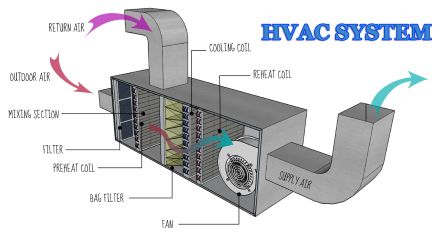
Heating and air conditioning systems control the temperature, humidity, and overall air quality in homes, businesses, and other buildings. By providing a climate-controlled environment, refrigeration systems make it possible to store and transport food, medicine, and other perishable items. When installing or repairing air conditioning and refrigeration systems, technicians must follow government regulations regarding the conservation, recovery, and recycling of refrigerants. The regulations include those concerning the proper handling and disposal of fluids and pressurized gases.
HVACR technicians may specialize in one or more specific aspects of HVACR, such as radiant heating systems, solar panels, testing and balancing, or commercial refrigeration. Some HVACR technicians sell service contracts to their clients, providing periodic maintenance of heating and cooling systems. As the complexity of buildings has increased, the field of HVAC has become multi-disciplinary, with building codes governing the installation of heating ducts and ventilation HVAC systems.
Because HVACR systems have become increasingly complex, HVAC technicians need to seek out postsecondary instruction from technical schools or community colleges that offer programs in heating, air conditioning, and refrigeration. These programs generally last from 6 months to 2 years and lead to a certificate or an associate's degree.
Apprenticeship programs usually last 3 to 5 years after graduation. Over the course of the apprenticeship, technicians learn safety practices, blueprint reading, and how to use tools. New HVACR technicians typically begin by working alongside experienced technicians, performing basic tasks such as insulating refrigerant lines or cleaning furnaces. In time, they move on to more difficult tasks, including cutting and soldering pipes or checking electrical circuits.
The US Environmental Protection Agency (EPA) requires all technicians who buy, handle, or work with refrigerants to be certified in proper refrigerant handling. Many trade schools, unions, and employer associations offer training programs designed to prepare students for the EPA certification exam. In addition, some states and localities require HVACR technicians to be licensed. Finally, workers may need to pass a background check prior to being hired.
HVAC technicians. Technicians can become certified at the professional level or the master specialist level. Each certification has different criteria. For example, the professional level certification requires that the technician have two years of industry experience. This credential also requires the passing of a comprehensive exam in areas such as residential air conditioning or heat pumps. Master specialist certification requires three years of field experience and passing of the professional-level exam.
EPA 608 Certification is a required certification for HVAC technicians as part of the Clean Air Act because of the position’s requirements of dealing with equipment that has the potential to release refrigerant into the atmosphere. Refrigerants have been shown to contribute to buildup of Greenhouse gases and can have negative impacts on the environment. Not to mention, refrigerants can have adverse effects on human health too.
The HVAC Quality Installation (QI) standard is administered by one of the HVAC industry’s most important professional and technical organizations, the Air Conditioning Contractors of America (ACCA). Certification in ACCA’s QI standard can be obtained in residential HVAC design or in light commercial HVAC design. Those who receive the certificate must demonstrate the ability to effectively design an HVAC system for either a residential or light commercial application. The system design must use proper techniques and the technician must demonstrate knowledge of factors such as duct design, load calculations, and the use of HVAC-specific software.
The Refrigeration Service Engineers Society (RSES) provides several different levels and subject areas of HVAC certification, including the mandatory EPA Section 608 certification for refrigeration workers. There are eight specialized written examinations: commercial air conditioning, commercial refrigeration, controls, domestic service, dynamic compression, heating, heat pump, and HVAC-R electrical. Please note that these specialized credentials are exclusively for active members of RSES. The organization also provides R-410A training and certification.
A detailed analysis of typical power plant boiler is illustrated in this video with help of animation. Here working and construction details of water tube boiler is explained. Different parts of boiler such as economizer, super heater, re heater, water wall and steam drum are illustrated here.
Refrigerators, which have become an integral part of every household, work based on some simple and interesting scientific principles. Beginning with a basic refrigerator model, this video will elaborate on the operation of modern refrigerators, along with the secrets behind their high energy efficiency.
Working of a wind turbine is illustrated in this video with the help of animation. The topic covered are blade design, use of brake, velocity sensor, yawing mechanism, blade tilting, wind turbine efficiency and Betz's limit.
Air conditioners maintain room temperature, removing airborne particles and humidity. This video explains the operation of air conditioning sytems.
The HVAC program will provide you with advanced training. After completing this program, learners will be able to apply principles of heating, ventilation, air conditioning, and refrigeration to the installation, maintenance and repair of HVACR systems. Further, students gain knowledge of the different types of copper, plastic, and carbon steel piping commonly used in HVAC projects.
Ask yourself if you can see yourself in the HVAC field, as a heating, ventilation, or air conditioning technician, working with complex equipment. While classes and internships will prepare you well, certain innate qualities that you bring to bear will help you succeed.
Attending college offers benefits beyond academic learning. Students are exposed to diverse perspectives that challenge their thinking. This fosters problem-solving and communication. College is also about social skills. Whether through student organizations or sports teams, students develop leadership skills and build lasting friendships.
This website is not affiliated with any educational institution, and all trademarks are the exclusive property of the respective owners. All copyrighted works on this website are offered for educational purposes only, governed by the four-factor rule, section 107 of the Copyright Act. CampusInspector.com is the work of a group of students in Bangkok, using data from the US Department of Education, Postsecondary Education Data System (IPEDS). If any information is incorrect, please contact us with updates.